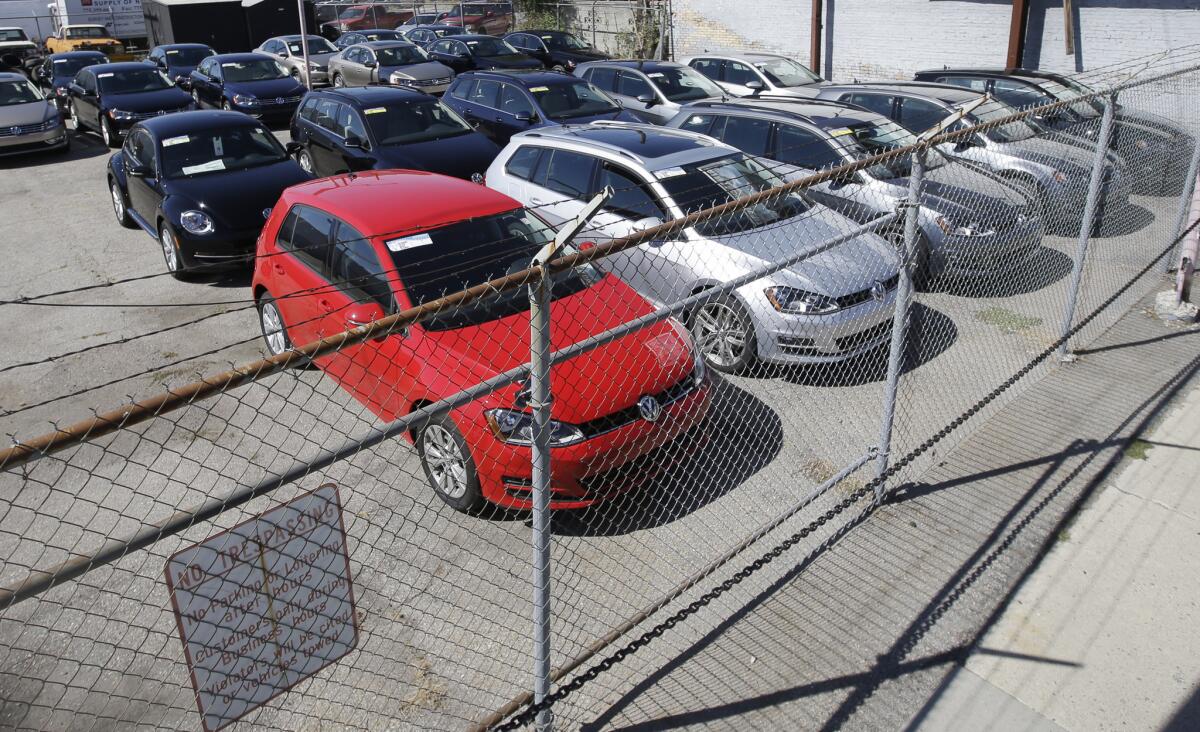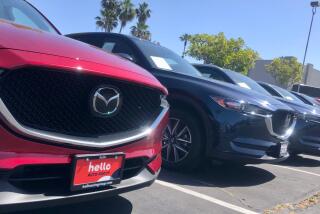Op-Ed: Fix VW’s polluting diesels, and fix the recall system too

Volkswagen diesels are shown behind a security fence on a storage lot near a VW dealership in Salt Lake City.
- Share via
Hundreds of thousands of Volkswagen diesel cars on the road in the United States with “defeat devices” are spewing 10 to 40 times the allowed amount of nitrogen oxide into the air — and will never be repaired. Because most recalls are optional, many owners won’t bother to comply.
From 2000 to 2008, the Government Accountability Office found on average that about 30% of defects were not fixed within 18 months of a recall. For some recalls, the failure-to-fix rate rose above 70%.
Volkswagen diesel owners are particularly likely to forgo repair of the emission problem because the solution will actually reduce their cars’ fuel efficiency. Would you want to drive your car to a dealership and lose use of it for a day or two, so that in the end the car will drive four miles fewer per gallon? Sure, in the abstract, VW owners care that nitrogen oxide is linked to serious respiratory problems, including emphysema. But the concrete hassles and certain miles-per-gallon degradation make it easier for the manufacturer’s recall notice to slip their minds.
We can do better.
To increase cooperation rates, Volkswagen could compensate only those owners who have repaired their cars. What’s more, the federal government could make it harder for owners to keep driving faulty vehicles. Some states, including California, will not allow a car to pass its emissions test if it has not completed all emission-related recalls; the National Highway Traffic Safety Administration could mandate that all states follow suit.
The Volkswagen scandal presents us with an opportunity to revise our recall regulations more generally. When I failed to take in my Prius to repair a sudden-acceleration defect, I wasn’t just putting my family at risk; I was also endangering other people that my accelerating car might hit. Yet nothing in our current law stops me from driving a car with a well-known safety defect year after year.
With today’s technology, it should not be difficult to block owners from reselling or reinsuring cars that have not received recall repairs. Dealerships should have the right to complete any outstanding recall repairs whenever a car is brought into a shop — without asking the owner’s permission. As a last resort, police could be empowered to “boot” cars with substantial safety defects.
At a minimum, when the NHTSA finds that a defect represents an “imminent hazard” to public health or safety, it should have the authority to require that owners receive compensation for the annoyance of a trip to the dealership.
Moving away from the owner-optional model could have the added benefit of lessening the total number of frivolous recall orders.
Recall orders now exceed the number of new vehicles sold by a factor of two to seven, depending on the year. This ballooning recall volume, routinely affecting more than 20 million vehicles, is caused by the agency’s position that the existence of more than a “de minimus” number of failures in a “safety-related” component constitutes a recallable “defect,” even without any evidence that the component failure has caused a single accident.
But just as voter complaints have limited the number of mandatory Internal Revenue Service audits, complaints from owners who are suddenly forced to fix their vehicles may check regulators’ willingness to announce recalls at the drop of a hat.
By jettisoning recalls of poorly documented safety defects, while simultaneously mandating and compensating owners to fix well-documented defects, we could end up with fewer hassles — and fewer dangerous cars on the road.
Ian Ayres teaches at Yale Law School.
Follow the Opinion section on Twitter @latimesopinion and Facebook
More to Read
A cure for the common opinion
Get thought-provoking perspectives with our weekly newsletter.
You may occasionally receive promotional content from the Los Angeles Times.










